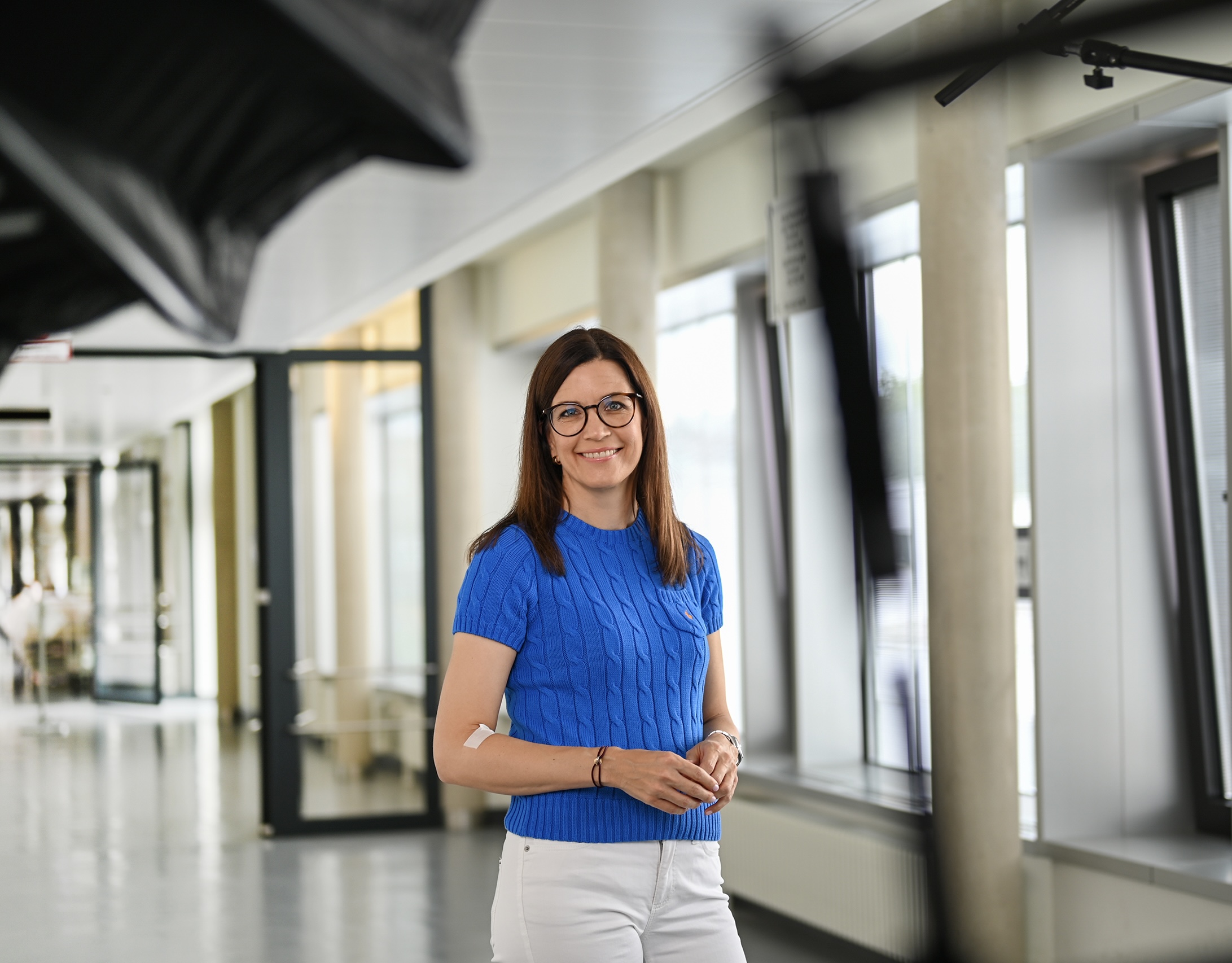To mark World MS Day, we spoke to Nadja Birkenbach-von Kuzenko, who has had multiple sclerosis (MS) since 2015. She is the initiator of the MS sponsorship programme at the Klinikum rechts der Isar in Munich. This programme allows patients to exchange information and support each other.
Who are you?
My name is Nadja Birkenbach-von Kuzenko, I am 49 years old and I am the initiator of the MS sponsorship programme. My hobbies include cooking, playing golf, hiking, singing (to the chagrin of some listeners – laughs), and after 20 years of fear of flying, I have discovered the joy of flying and now travel with enthusiasm.
When did you receive your diagnosis?
I was diagnosed with MS on Monday, 21 September 2015. The diagnosis was made after massive visual disturbances with double and wobbly images. Looking back, however, there were earlier signs:
In 2004, I had heavy legs, which I ignored.
In 2006, I felt a tingling sensation in my face. The MRI showed small “spots”, which the radiologist attributed to my migraine. In winter, I had slight visual disturbances, which my ophthalmologist diagnosed as dry eyes. After three weeks of eye drops, the symptoms disappeared.
In spring 2015, I had numb fingertips, which the orthopaedist attributed to my neck and treated without sending me to a neurologist.
21 September 2015: When I told Prof. Dr Bernhard Hemmer (Director of the Department of Neurology at Klinikum rechts der Isar) about my numb fingers, he asked me why I hadn’t seen a neurologist. To be honest, I would never have thought of going to a neurologist. And Prof Dr Hemmer went on to say: “Mrs Birkenbach, if you have toothache, you don’t go to a cardiologist either.” That really made me laugh.
How has your everyday life changed since the diagnosis?
Everyday symptoms such as dizziness caused by not drinking enough water or sore muscles after exercise often cause me to panic. Although they often have nothing to do with my MS disease, I immediately associate them with it. When I think about the future, I often wonder whether MS will restrict my quality of life and whether I will still be able to cope with everything in 20 years’ time.
How do people react when you tell them about your MS?
Where is your wheelchair?
When I tell people about my MS, I often encounter pitying looks and questions like “Where’s your wheelchair?”. It bothers me immensely that people with MS are often labelled as disabled or that people with MS are automatically confined to a wheelchair in people’s minds.
Yes, there are people who end up in a wheelchair, but that doesn’t apply to everyone. Some MS patients are even ashamed and hide their illness in the workplace for fear of being seen as unable to cope or unable to pursue a career.
for a career.
It’s a constant battle and some don’t even dare tell their own parents about their illness or even take time off for infusions.
You can’t tell by looking at you!
When I walk through a supermarket, I can’t recognise who has MS, any more than someone who has cancer or another disease. The old image of MS still persists in many people’s minds, accompanied by a huge information gap and false assumptions,
which I would like to correct. That’s why I’m involved with art tempi as a patient advocate to educate people and debunk myths about MS.

The current research results and advances in MS research make me very happy. Once a year, I attend a meeting at the Klinikum rechts der Isar, where many of these advances are shared. There are more and more drugs and a lot is being done to better understand and treat the disease. The doctors and researchers are extremely committed.
This progress gives me hope for the future. I sincerely hope that one day MS will be cured. Until then, I hope that the current drugs will enable milder courses and that we will see progress in predicting and adapting therapies. I hope that everyone living with MS can cope well.
Compared to the situation 30 years ago, I am grateful for today’s possibilities and progress.
What advice would you give other MS patients?
When you are diagnosed with MS, it is important to find a trustworthy neurologist who will look after you well. At the Klinikum rechts der Isar, I feel that I am in good hands and well informed about the latest treatment options. Finding a suitable therapy is crucial and it is important to feel that your medical concerns are taken seriously. Apart from medical care, lifestyle factors also play a role. A healthy diet, with lots of vegetables and little meat, and regular exercise are important for my well-being. I personally try to do endurance and strength training three to four times a week.
Nadja Birkenbach-von Kuzenko tells us even more in the podcast with MS Perspective:




